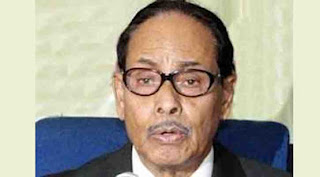AMERICAN psychotherapist Colette Dowling coined the phrase Cinderella
complex, which basically means an unconscious desire of a person to be
taken care of by others. The complex is said to become more apparent as a
person grows older, and last week it was proven when Jatiya Party
chairman Hussein Muhammad Ershad threw a challenge at both BNP and Awami
League. He said that these two parties together would not be able to
defeat him if the presidential form of government was restored and he
contested for the top job. Between the lines, Ershad was pleading others
to take care of his wishful thinking.
The first thing about
Ershad’s challenge is that it is a sign of deep psychosis. There are
unhappy citizens in this country, who in their desperate moments of
despair, talk about voting for the former military strongman. I know it
because I have heard it myself on several occasions at social
gatherings. People, who are fed up with the ruling and opposition
leaders, vent their frustrations by vowing to vote for this deposed
dictator.
Does that mean people of this country want him back? Let
me give you a hint. When someone commits suicide, it is not because
that person loves death but because that person hates life. If Ershad is
inspired by his ersatz popularity, it is not because people think of
him as their choice but because they do not have any choice whatsoever.
The psychosis goes even deeper. It shows this man is inordinately
focused on himself. He is more interested in his election as the next
president of Bangladesh than leading his party to success.
If
anybody has followed Ershad for last four years, he has been all over
the political landscape. It has been more difficult to hold him to any
particular commitment than catching a fly with a pair of pincers. He
must have vowed an umpteen number of times to leave the Grand Alliance.
Then he always returned to its fold like a cat, which taken away from
home, comes back from anywhere.
Why should people vote for him is
the question he needs to ask himself. He has run this country longer
than any other ruler in one long stretch of nine years. But what is the
one thing for which he stood out then and also in the political ruckus
of last four years? How has his previous experience shaped his
performance this time as a partner in power? If anything, he has
convinced us of his evermore burning desire to return to power for one
last time.
Ershad has his reasons for this desperation. He wants
to erase the stigma associated with his name for grabbing power as a
military ruler and then being forced to abdicate in disgrace. He is also
the only ruler in this country, who has served prison sentence. One
cannot blame him for hanging around the corridors of power at the ripe
age of 83. He has even made a dash to Delhi, all with the instinct of a
compulsive gambler who loses more money under the illusion that one good
hand will recover the entire loss.
Perhaps it takes a special
kind of people to hanker after power even in their sunset age. It may be
the same reason why werewolves howl during a full moon, or peacocks cry
before rains. Perhaps it is only natural that powerful people should
seek power like mobile phones need recharge. It must be a pathological
thing without which they feel helpless like the Wizard of Oz bereft of
his wonder machine.
There was an urgent appeal in Ershad’s cogent
challenge, a sense of destiny ringing through it. At his age, even a
superman cannot but think of death. So his politics must be sharpened to
one very last chance, not so much to enjoy the trappings of power again
but to unburden himself of the ignominious baggage he has been carrying
from the past.
US President John F Kennedy was once asked what he
would do with his life after he left the White House. His replied that
he did not know because he would be at the awkward age, too young to
write his memoirs and too old to start a second career. Kennedy’s
contradiction was resolved by an assassin’s bullet that snuffed out his
life before getting to that stage.
Ousted from power 23 years ago,
Hussein Muhammad Ershad had plenty of time to write his memoirs, but he
wasted it planning a second career to return to the first. Meanwhile,
people wonder what happened to his flair for writing poetry after he was
forced to resign. If his treatment of poetry is any hint, it can be
extrapolated to understand his position on other things in life. In
commitment or challenge, can this man be taken seriously?


No comments:
Post a Comment